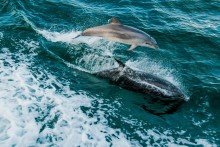Two of Dorset’s leading wildlife conservation organisations, Dorset Wildlife Trust (DWT) and MARINElife are calling for the waters of Lyme Bay in Dorset to gain special protection to aid the survival of vulnerable and spectacular marine giants, such as whales, dolphins and basking sharks.
In a report published by the Wildlife Trusts, part of Lyme Bay has been named as one of the 17 special sites in England and Wales which need to be protected for marine giants, also known as ‘mega fauna’. These sites are ‘hot-spots’ where these animals gather to feed, breed and socialise.
Amongst the UK’s most spectacular wildlife, animals such as dolphins, whales, and sharks are continuously at risk from damaging human activities such as marine litter, industrial fishing and pollution. Whilst the Government has begun protecting areas of sea by developing MPA’s (Marine Protected Areas), this will only protect wildlife and habitats on the sea bed. Mobile wildlife has been omitted from this developing network of protection.
Conservation Science Manager for MARINElife, Dr Rachel Davies, said, “Research carried out by MARINElife has highlighted part of Lyme Bay as a nationally important foraging area for white-beaked dolphins,and we see them return to the same site regularly. Harbour porpoise are regularly recorded in all seasons, and there are also important numbers of common dolphin and bottlenose dolphin. Locally and nationally important numbers of the globally endangered Balearic shearwater, as well as guillemot, razorbill, great skua and gannet are present in the area, along with the marine giants, minke whale and basking shark.”
DWT Marine Awareness Officer, Julie Hatcher, said, “Another site off The Lizard Peninsula in Cornwall is proposed for protection as one of the UK’s top four whale and dolphin hotspots. Among the 14 cetacean species recorded there are England’s South West bottlenose dolphin population, some of which are regular visitors to the Dorset coast and can often be seen from Durlston Head and Portland Bill. Protecting this site is very important for Dorset’s bottlenose dolphins, and we’re encouraging as many people as possible to get involved with supporting us.”
The Wildlife Trust’s save our Ocean Giants campaign is calling on people to sign the e-petition, which will be presented to the Government later this year. To find out more and sign the petition, visit www.wildlifetrusts.org/oceangiants. You can also share this campaign on Twitter using #act4giants and #oceangiants.







